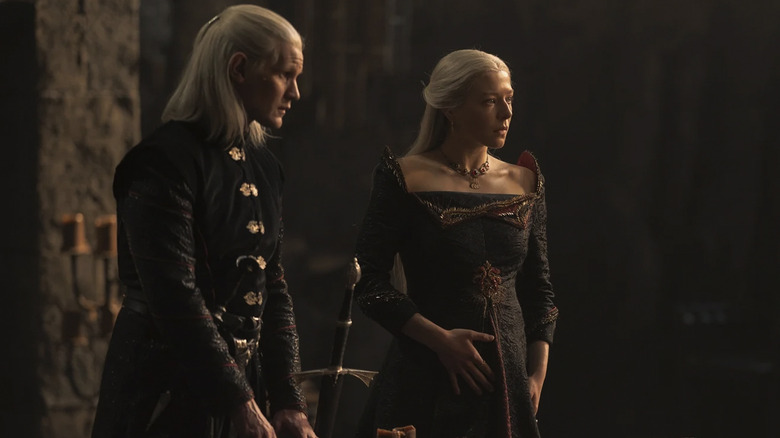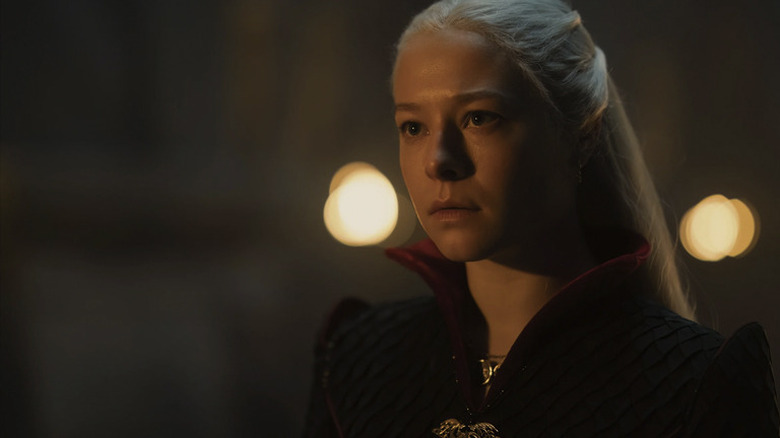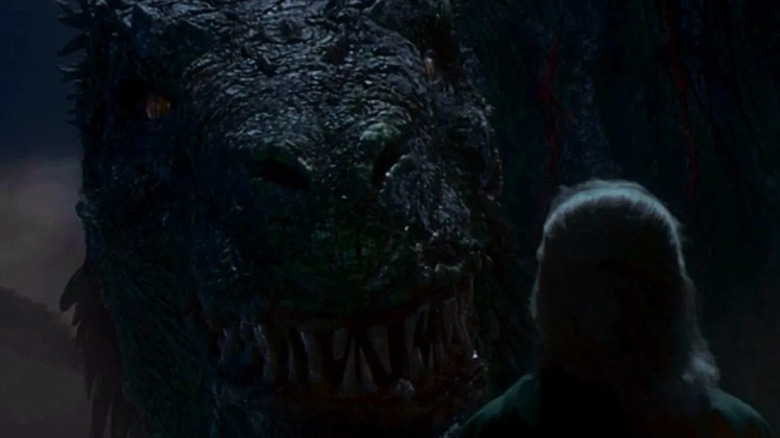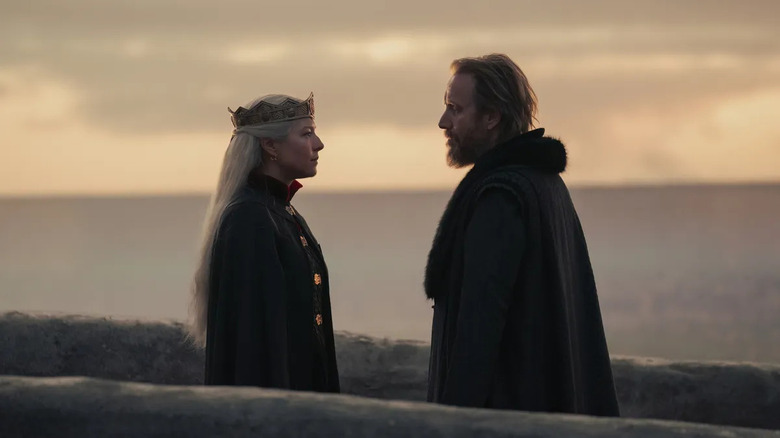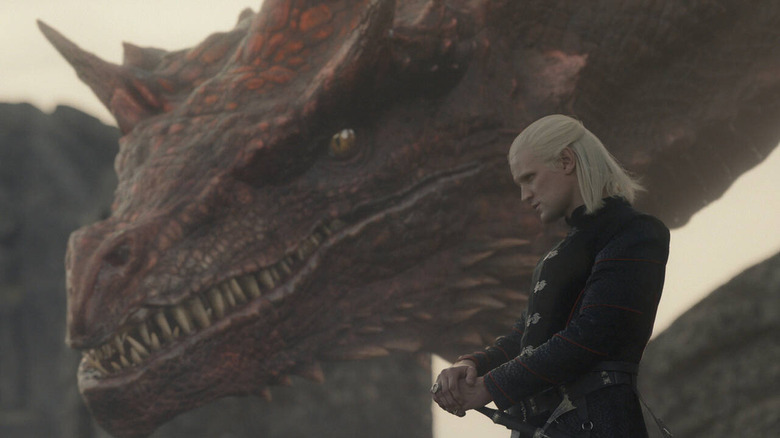The Biggest Lessons House Of The Dragon's Showrunner Is Taking Into Season 2
The first season of "House of the Dragon" has come to a close in a predictably brutal way. The "Game of Thrones" sequel series has shown in its first batch of episodes that it has inherited many of the strengths and habits of its predecessor, from the morally gray characters to the rich and deep world in which it takes place.
As the show heads toward its second season, it's natural for many to worry that it could also inherit the worst traits "Game of Thrones" developed as it went on. The original series was extremely good until it suddenly wasn't, when the showrunners overtook the source material of author George R.R. Martin and rushed the story towards a conclusion. A show with gigantic potential was unable to stick the landing.
With "House of the Dragon" off to a strong start in its own right, showrunner and executive producer Ryan Condal is hoping to do what "Game of Thrones" showrunners David Benioff and D.B. Weiss ultimately ended up failing to do: maintain momentum and adapt the show for the better.
In an interview with The Hollywood Reporter, Condal discussed his thoughts on the season finale and what the show hopes to accomplish moving forward, including a few key lessons he learned.
A million little things
Having previously worked with "Lost" co-showrunner Carlton Cuse on the short-lived USA Network series "Colony," Condal is not completely inexperienced at heading up a television program. Still, "House of the Dragon" is by far the biggest production Condal (or almost anyone, for that matter) has been a part of, with the eyes of millions focused on his work. According to Condal in the Hollywood Reporter piece, the lessons learned during his first season at the helm of this Westerosi vessel have been countless:
"There's a million little things you learn in the process of making any first season. We made 10 episodes. They were extraordinarily difficult. I intend to put all those lessons into use on season 2. They were less sort of universal concepts about making television and more about making this particular show –- even for [crew members] who worked the original 'Game of Thrones.' They're more [producer-oriented] than creative; ways to do things more efficiently."
It makes sense that there would be some learning curves taking over production of such a big-budget series. With so much pressure to both live up to and avoid the pitfalls of "Game of Thrones," every production decision must have felt vital and weighty. While the show has largely impressed audience so far, there are definitely aspects that could be improved.
A tad dark
One production decision that drew a lot of criticism was how dark some of the show's night scenes were. Seemingly not learning a lesson from the much-maligned episode of "Game of Thrones," "The Long Night," the nighttime scenes in "House of the Dragon" have been extremely hard to follow for many viewers at home. While the scenes' extreme darkness has been called an intentional creative decision, it's one that seems to be pretty universally reviled by fans who may own lower quality televisions.
In a Variety interview, Condal addresses these criticisms:
"The unique challenge of making television post-production is that you're making it in this highly calibrated facility with millions of dollars' worth of equipment and high-end professionals [...] When you're making television, you're turning it over to not only tens of millions of different television setups — rooms with curtains and no curtains, lighting and no lighting, speakers and no speakers — but you're also turning it over to these different distributors who are going to take the file and compress it or not compress, or show it and 1080P or 4K. It's very hard to account for all those little variables when you're making the show. What I learned in the making the season is that you do have to take much more into account the fact that we are making the show for people's television sets versus in a perfectly calibrated movie theater environment."
One of a lot of people's favorite parts of TV shows is being able to see what's happening on the screen, so this would be a great lesson for Condal and his team to take into consideration going forward.
An embarrassment of riches
But the lessons weren't just production-related. In the Hollywood Reporter interview, Condal talks about some of his main takeaways in terms of the creative and writing side of the show:
"The wonder of going into season two –- for any show, but for this one in particular -– is we have such an embarrassment of riches in terms of the great cast that we put together. The writing is so much easier because you're now writing for this great cast [who we have now seen] embody these roles. They're three-dimensional characters and it makes their story so much easier to tell because they're already embodied and there's a joy in the writing because of that."
This lesson is a far more positive one. The cast of "House of the Dragon" has done a great job at bringing their characters to life, with some even getting the nod from George R.R. Martin himself as having improved the characters he wrote in the books. "Fire and Blood," the book on which "House of the Dragon" is based, was written as an in-universe history, which left a lot of room for further characterization of the figures involved. While the fate of "Game of Thrones" is a cautionary tale in terms of diverging from a show's source material, the change in mediums necessitated a degree of adaptation. It makes sense that, now that actors like Emma D'Arcy and Matt Smith have put parts of themselves into their characters, the writers would be able to write to their strengths as performers.
Limitless potential
The truth is, even if "House of the Dragon" had completely sucked, it would have attracted tons of viewers. That's just the strength of existing intellectual property in media. That's what allowed "Game of Thrones" to become so lazy and rushed at the end. The creators knew they'd be getting their giant paychecks, so who cares how good the show is?
Whatever its faults so far, "House of the Dragon" has proven itself to not be a shameless intellectual property cash-in. The show's writing and performances have true artistic merit on their own, and the series has the potential to be excellent. Now, as the show faces the challenge of building on its momentum, Condal is excited for it to grow in scope. "The show definitely has to expand its scope in the second season," he said in the Variety interview. "Just as the original 'Game of Thrones' grew in scope and expanse as it went, so, too, will ours."
The first season was a challenge, but one the "House of the Dragon" team managed to conquer. Even as more locations, ever-more complex political machinations, and dragons galore promise to be challenges to producers and writers alike, hopefully they take into account what they've learned and continue to improve what has already been a riveting piece of television.
